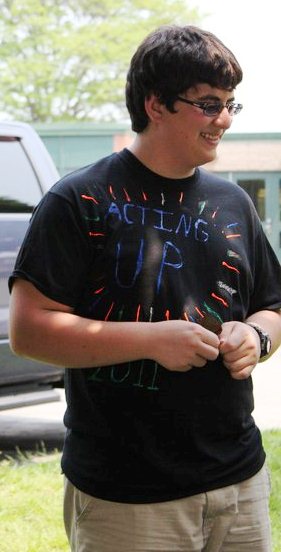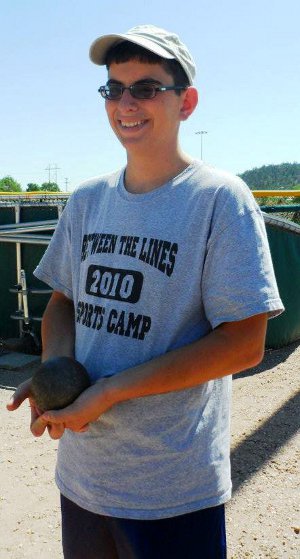On December 25, 2011, I weighed myself and saw the red arrow point towards 240 pounds. I knew that this was an unhealthy weight for a 15-year-old and realized I had to do something about it. I could no longer blame my lack of physical activity on my low vision. I was supposed to be participating in the United States Association of Blind Athletes (USABA) and WellPoint Foundation National Fitness Challenge, but I had not even done anything with that yet, which said a lot about me at the time. After weighing in at nearly 240 pounds, I was highly motivated to finally do something about my overweight body and make a change in my life for good. I knew if I set my mind to it, I could win and beat the competition by losing the most weight.
Caption: Photo of Cooper Kendall at 240 pounds.
On December 27, 2011, I took action. I went outside in 20-degree weather for a run, a simple 3.2-mile loop that became my daily activity. I got to the point that, without my daily run, I felt lost and anxious. I ran every day for two months before ending the streak due to poor weather, but the next day I was back in my routine. I began to feel good about running and started to pick up my mileage to five miles, a long run for me. By this point I was about 200 pounds, and I added dieting to my daily exercise. People were starting to notice my weight loss, and for the first time in my life, I started to feel like an athlete. I continued to run for a few more weeks and, eventually, made one of the best decisions of my life by signing up for a local club rowing team.
The week before crew started I ran 11.6 miles, and the feeling of being able to run that far was new to me. It felt remarkable. Once rowing started, I took some time off from running and began training and conditioning for the rowing team. The conditioning started off feeling very difficult because I had been burning fat and muscle throughout my running career, and I did not have much muscle to begin with. Circuit training and rowing machine workouts eventually become easier, and by the time we got to the boat, I was eager to start learning how to row. Rowing changed my body even more than running. I started to see muscles accumulating, and I actually got my weight down to 180 pounds, my lowest yet. It is an awesome feeling!
I had a fire inside me that motivated me to become the best rower I could, and although I was a novice, we had a pretty decent crew team. I rowed through the spring and into the summer with the Blood Street Sculls, learning skills from specialized trainers and coaches. As I became more committed to rowing, I bought an Erg Rowing Machine and used it at home for many of my workouts. By September 2012, I was ready to go back to the Blood Street Sculls and be a better athlete. After running and rowing, I finally saw myself as a real athlete because I was fit enough to row 5,000 meters, and I was moving up in the boat lineups. This was one of the best feelings ever. I was actually accomplishing what I set out to do. As the rowing season came to an end, I made a promise to myself that winter was no longer an "off season" for me. Although I shifted my interests to the school musical, I continued to be in training mode by lifting weights and doing cardio. I set a goal of returning back to the Blood Street Sculls in the spring and to make my school's varsity rowing team.
Caption: Photo of a physically fit Cooper Kendall.
I learned that setting goals was the best way for me to live my life. After watching myself accomplish what I set out to do, I have become more open to trying new things. If people tell me to try something, I immediately go for it. Even if I do not get it right away, I know that with practice I will one day succeed.
Even though I was a participant in the USABA and WellPoint Foundation National Fitness Challenge and wanted to win, I also wanted to prove to myself that I could do it. Losing weight was mainly for my own personal reasons, but because I lost the weight, I received the benefits of an awesome trip to Colorado Springs, Colorado in June 2012 to attend the National Sports Education Camp, a reward designated for the boy and girl in the fitness challenge who lost the most weight and decreased their body mass index. It was really neat to show myself off as an athlete and meet other people who had been applying themselves in various ways throughout the National Fitness Challenge program. I know that without the start of the USABA and WellPoint Foundation National Fitness Challenge I would not have found the motivation to get active and lose weight. Being a part of this program was the best thing that has ever happened to me and has truly changed my life for the better. Now, I see a lot of potential in myself and I am truly proud of how far I have come with changing my life.
About the USABA and WellPoint Foundation National Fitness Challenge
The objective of the National Fitness Challenge is to provide teenagers who are blind and visually impaired opportunities to achieve a higher level of fitness and to maintain or reduce their body mass index. Last year, 16 agencies participated in the National Fitness Challenge. This year's program has grown extensively with more than 20 participating agencies from across the United States who will provide more than 700 teenagers who are blind and visually impaired with an opportunity to increase their physical fitness levels and live a healthier and more active lifestyle.
In order to keep track of each participant's success, every agency submits baseline data and monthly updates that are used to create achievable fitness and weight loss goals for each teen. Mark Lucas, executive director of the United States Association of Blind Athletes, said, "Last year the number of students participating in the program was 603, and of these 603 students, 393 (65%) maintained or reduced their body mass index. With numbers like that, we predict a great success rate for a second year of the National Fitness Challenge." With the renewal of this grant from the WellPoint Foundation and through the partnering agencies, USABA will provide each agency with sports equipment as well as fitness and nutrition coaches for teens participating in the program.
"The WellPoint Foundation helps us continue meeting the company's commitment to helping children and adults live active lives and avoid the health risks associated with sedentary lifestyles and obesity," said Bill Smith, president and general manager of WellPoint's Disability and Life business. "We believe no one should be denied the right to enjoy the physical and emotional benefits associated with exercise. Therefore, we are very proud to once again partner with the USABA to ensure that vision impairments do not limit the recreational opportunities afforded to teenagers across the country."
Research has consistently shown that individuals who participate in regular physical activity to improve their health have higher energy levels, a lower risk of health-related diseases, improved psychological health, and lower rates of depression and anxiety. Unfortunately, because of the many barriers and misconceptions about their abilities, approximately 70 percent of the nearly 56,000 children and youth who are blind and visually impaired in the United States do not participate in even a limited physical education curriculum. The implementation of the National Fitness Challenge is one program USABA and the WellPoint Foundation are using to break down these barriers.

